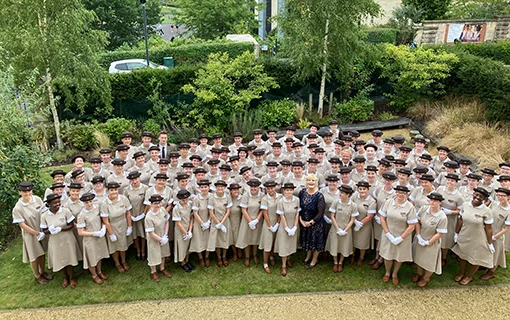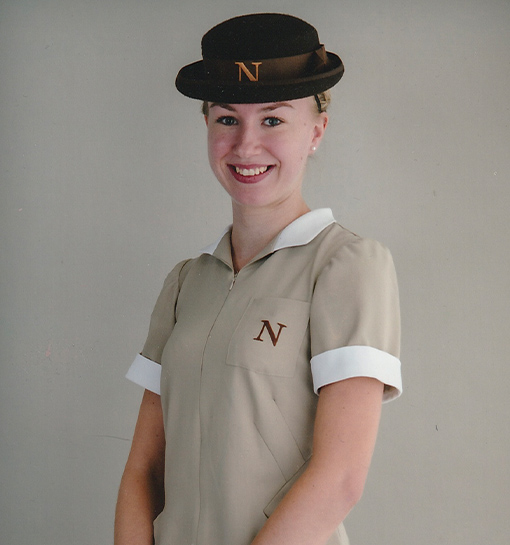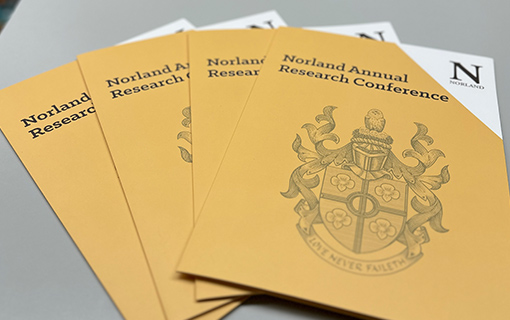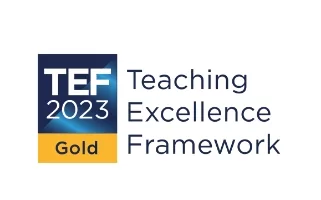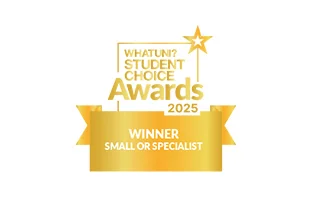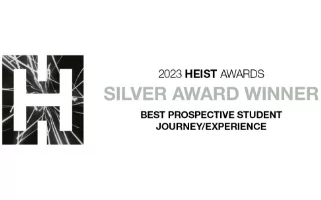Frequently Asked Questions (FAQs)
Discover Norland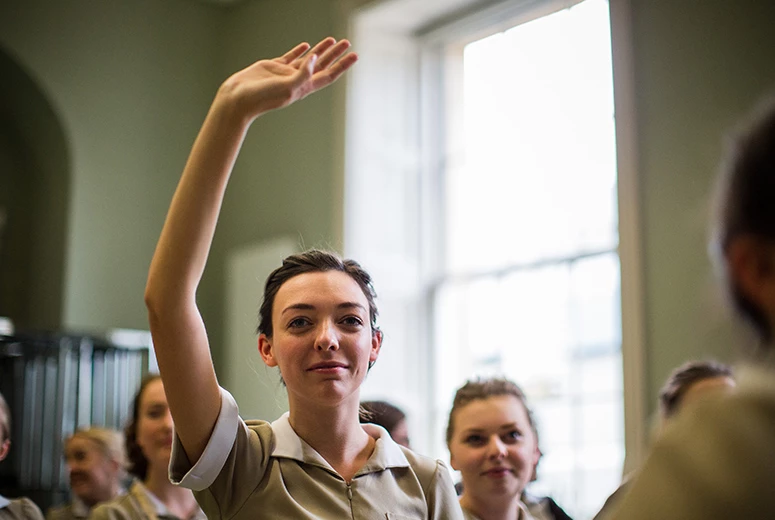
FAQs - Entry requirements, admissions process and applying to Norland
The BA (Hons) degree and the diploma are fully integrated and cannot be studied independently of each other. The diploma is a distinctive and prestigious qualification, which allows students to apply the theory they have learnt on the degree to practice. Following the successful completion of three years at Norland and having earned your degree, you will embark on your final module of the diploma: the Newly Qualified Nanny (NQN) year. There are no tuition fees due in this fourth year of training. As an NQN, you will spend 12 months as a probationary nanny in paid full-time employment arranged through and fully supported by the NQN team. You will continue to be fully assessed during this year. Only when you have successfully completed the NQN year and earned your diploma and badge will you be able to use the professional title ‘Norland Nanny’ or ‘Norlander’ and be registered with the Norland Agency to access its jobs database and the lifelong support of Norland.
Yes, as long as the total achieved from Level 3 qualifications equates to 96 or more UCAS points. If you’re considering applying to Norland, you can calculate your points or anticipated points with the UCAS Tariff Calculator. If in doubt about whether your qualifications are valid for studying at Norland, please check with our Admissions team.
Some NVQs are listed on the UCAS Tariff Calculator and can contribute to our entry requirements. If you are unsure then we advise that you check with our Admissions team.
No, unfortunately we do not accept apprenticeships.
Yes. Mature students do not necessarily need to meet the traditional entry requirements if they have substantial and relevant experience and can demonstrate that they would be able to meet the academic requirements of degree level study. Read our widening participation statement
Yes. Norland accepts international students. If you’re applying to Norland and don’t have UK qualifications, you’ll need to arrange for the UK ENIC to confirm your qualifications. Please visit our international students and entry requirements pages for more information.
The UK officially left the EU on 31 January 2020, followed by a transition period that ended on 31 December 2020.
The UK government has introduced a new immigration system, the Student route, for all applications made from outside the UK, including EEA nationals, who will enter the UK for studies from 2021 to study a course which meets the requirements of the route.
For more information visit the UK Council for International Student Affairs (UKCISA) website
This means EU, EEA or Swiss nationals who wish to begin studying in the UK from August 2021 onwards will no longer be eligible for home fee status, undergraduate, postgraduate or advanced learner financial support from Student Finance England for courses beginning in the academic year 2021/22.
It will not affect students who started courses in the academic year 2020/21, nor those EU, other EEA and Swiss nationals benefiting from Citizens’ Rights under the EU Withdrawal Agreement, EEA EFTA Separation Agreement or Swiss Citizens’ Rights Agreement respectively. It will also not apply to Irish nationals living in the UK and Ireland whose right to study and to access benefits and services will be preserved on a reciprocal basis for UK and Irish nationals under the Common Travel Area arrangement.
Visits to open days include a presentation covering an outline of the course and the guaranteed employment opportunities available to Norland graduates. You will then be able to explore Norland at your leisure, meeting staff and students who will be able to answer any questions you may have about coming to Norland and living in Bath. We also offer virtual open events if you’re unable to visit Norland in-person. Find out more about open days
We encourage visitors of any age to come to an open day. Attending a Norland open day will help you decide whether a career as a Norland Nanny or Maternity Practitioner is the future that you want to work towards. Find out more about open days
Every applicant that meets our entry requirements is invited to an interview day at Norland. There are several interview days each year, which run from October until we close applications, and they are usually held on a Friday. If you’re applying to Norland, the earlier you submit your application, the sooner your interview day will be. You will be interviewed by a member of our academic team and participate in a group task. Details will be provided in advance. For applicants based overseas, we will arrange a virtual interview day.
We’re here to help you with any of your learning support or pastoral needs and to answer any questions you have about the issues that affect you. Student support officers are your first point of contact and offer a completely free, confidential and supportive service that is designed to fit in with your needs.
We offer a wide range of support to students with specific educational needs and/or disabilities. We also provide academic skills sessions and special seminars based on your learning requirements, helping you to identify and achieve your study goals. You will also have a personal tutor who will provide you with academic advice and support. You’ll also have access to Health Assured’s Student Assistance Programme which offers 24/7 support.
If you’re an international student, you’ll also have access to your own dedicated Visa Manager to provide specific support both before you arrive in the UK and during your time at Norland.
The Emily Ward Bursary, named after Norland’s founder, provides students with the opportunity to obtain a grant towards meeting the cost of their tuition fees or uniform. There are a limited number of bursaries available each year. For more information, visit our finance & bursaries page
If you are offered a place at Norland, a member of the Admissions team will contact you shortly after results day in August.
For any further questions or advice, please contact our Admissions team
The Student Terms and Conditions sets out key aspects of the relationship between you as a student, and Norland. The Terms and Conditions together with your Offer Letter; Fees, Refund and Compensation Policy; Acceptance Form; and Norland Student Policies and Procedures form the basis of a contract between you and Norland for the provision of educational services in respect of our BA (Hons) degree and diploma. It is important that you read these documents in full before accepting your offer of a place to study at Norland. You can find these on our student policies page or by entering the document title in the policies keyword search box.
Bath is a small city in south west England, known for and named after its Roman-built baths. Located in the valley of the River Avon, Bath is approximately 11 miles (18 km) southeast of Bristol and 97 miles (156 km) west of London.
By air
The nearest airport to Bath is Bristol International Airport, which is approximately 20 miles away. You can travel between Bristol Airport and Bath via the Air Decker bus, the Bristol Airport Flyer via rail to Bristol Temple Meads or via taxi.
If you’re flying into the UK via an airport in London, the most practical transport between Bath and London is by train or coach.
By train
The main train station in Bath is Bath Spa, which is located in the heart of the city and is serviced by trains from London Paddington (80 minutes), Cardiff Central (70 minutes) and Bristol Temple Meads (10 minutes) as well as other towns and cities. Find out more about train services to Bath from Great Western Railway.
By coach
Bath bus station is located next to Bath Spa train station and coaches from cities with airports such as Bristol and London regularly arrive and depart here. National Express provides coach services between major towns and cities as well as London Victoria coach station, London Heathrow and London Gatwick airports.
Other transport
A taxi rank is located outside the railway and bus stations. A number of taxi companies as well as Uber operate in the city.
More information can be found on the Visit Bath website
The UK government sets expectations on the amount of money international visa students will need to have to cover living costs to to support themselves while studying in the OK (outside London). For the latest information, visit the government website
When you’re offered a place at Norland, we’ll ask you if you’d like us to help you find your first-year accommodation and, if so, we will then place you into a house with other Norland students, which has been visited and vetted by a member of staff. Visit the accommodation page for more information. Please note that UK landlords will require a UK homeowner guarantor for students. Alternatively, it is often possible to pay six months’ rent in advance – please contact the admissions team if you need more information.
For advice on the cost of living in Bath as a student, read the Whatuni cost of living in Bath guide
For advice on how to budget in the UK as an international student, visit the UKCISA website
For information about tuition fees and other costs to study at Norland, please visit our fees and study costs page
For information about other costs while a university student, visit our living costs and budgeting page
Setting up a student bank account will make it easier to pay bills, keep money safe and avoid unnecessary currency exchange charges if you were to use your card from your home country.
You may be able to start this process from your home country and your current bank may have links to banks in the UK.
View this guide to good international bank accounts for international students for more information.
International students can apply to the Emily Ward Bursary scheme, named after Norland’s founder, which provides a limited number of means-tested bursaries each year.
Applicants whose main place of residence is an overseas Commonwealth country may be eligible to apply for a Royal Commonwealth Society, Bath and District Branch Scholarship.
Finder and Studee also provide useful funding information for international students.
Visit the finance and bursary page for further information on the Emily Ward Bursary and Commonwealth Scholarship schemes.
Online apps and platforms such as Skype, FaceTime, Zoom, WhatsApp and Facebook Messenger, tend to be the best way to communicate with family and friends in another country.
Your current mobile phone will more than likely work in the UK, which operates on the same cellular frequency as most of the world. However, if you’re coming from Japan or North/South America, it’s worth checking whether your phone will work when living in Bath.
Applicants coming to the UK for six months or longer are required to pay a mandatory immigration health surcharge to access the National Health Service (NHS). As a Norland student this will apply to you. When you make your visa application online, you pay the surcharge as part of your application or when you book an appointment.
You will be required to pay the full cost of the health surcharge upfront for the three years that you will be studying the degree (and associated diploma elements) at Norland when you make your visa application. You can start using the NHS when you have paid the healthcare surcharge and your visa is granted. You will still need to pay for certain types of services, such as prescriptions, dental treatment and eye tests.
For further information about the health surcharge including the latest costs, visit our international students webpage.
We were granted a licence from UKVI to become a student sponsor in April 2021. Until we’ve proven a track record of compliance (which is granted after four years of consistent and successful student sponsorship) there are some limitations on permitted student activity. This means visa students can’t work while studying at Norland. This includes all formal working arrangements including all ‘non-paid’ formal volunteering arrangements.
Until we achieve our four-year track record of compliance, work placements at Norland must not make up more than 33% of a student’s overall course in the UK. As work placements currently make up just over 40% of the course at Norland, you’ll be required to complete part of your placements in your home country before your course begins. This requirement must be met by you completing four weeks of a work placement in a formal setting (such as a nursery/pre-school environment) that we must pre-approve. More information about this can be found in the student visa essential information document
We understand that moving to study in a new country can provide challenges. Our student support team are on-hand to help you in the transition to moving to the UK and adjusting to the new culture, and throughout your time at Norland.
Upon arrival, all international students will be invited to attend a one-to-one meeting with a member of the student support team for them to introduce themselves to you and explain the different ways they can support you pastorally and academically. When you start at Norland, you’ll also have a meeting with the Visa Manager who will introduce themselves and explain how they can help you during your time at Norland. All students are eligible for counselling sessions should they want it. Every student is assigned a personal tutor who will also be there to support them throughout their time at Norland.
You’ll also have access to Health Assured’s Student Assistance Programme which offers 24/7 support. So whether you’re feeling stressed about deadlines or missing home, you’ll always be supported at Norland.
We also have a student-led Here to Hear team who are a group of volunteers who’ve created a mentee/mentor scheme to talk through any worries, queries or concerns that students have in a safe space for those who may not feel comfortable speaking to a member of staff or would like to speak to someone who knows what they’re going through as a Norland student.
For more information about support as an international student, from advice on adjusting to a new culture to support with immigration matters, visit the UK Council for International Student Affairs’s (UKCISA) website
For the latest information about quarantining and the self-isolation period when arriving in the UK, please visit the government website
You will earn a private pension through your employer, as all employers must provide a workplace pension scheme through ‘automatic enrolment’. You are not eligible for public funds as per the conditions of your visa, so will not be able to earn a State pension.
It is possible to transfer UK pension savings to a pension plan in another country, but requirements and restrictions apply. You can find further information about this on the government website and it is advised you seek further specialist financial advice if this is something you wish to pursue.
You must pay both. Working on the Graduate route means you are subject to the same national insurance and income liabilities as UK citizens, and the IHS is also a requirement of the Graduate route.
Yes there is, and you can find further information about this scheme on the US government’s website
